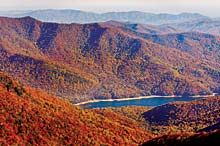Here’s the good news: If you’re on city water, you’re OK for now. The bad news: If you’re not, there’s no telling how long you may be affected by the region’s ongoing drought. Oh, and one more thing: Conserve, conserve, conserve.

That was the word from two recent meetings held to inform Western North Carolina residents about the water situation, both locally and statewide.
In a special Nov. 7 session called by the Asheville City Council, Water Resources Director David Hanks reported that the levels at the city’s North Fork Reservoir are down but still capable of supplying the system’s customers for at least six more months—even if the drought continues. Computer modeling, he said, gives the city a 10-week projection that guides water-conservation policy. Hanks also noted that output from the Mills River plant has been increased, and the Bee Tree Reservoir is slated to come back online early next year.
In mid-October, the city asked water customers to implement voluntary conservation measures—taking shorter showers, using car washes that recycle water, etc.—and Hanks said the public has complied. “We said please start conserving water, and they did,” he told Council members.
But heightened media attention concerning a statewide water shortage and reports of wells drying up in WNC have prompted worried constituents to call and e-mail Council members.
“We’ve got a public that is concerned,” said Vice Mayor Holly Jones.
In mid-October, Woodfin moved quickly from voluntary to mandatory water-conservation measures, noted Council member Jan Davis. “I have a great concern, and my neighbors do as well,” he said.
In response, government has produced a flood of information—including the city’s meeting, a Nov. 8 visit by the state Department of Environment and Natural Resources, a conference call to local media by the city to explain drought-projection models, and a report released by Gov. Mike Easley‘s office on statewide conservation progress.
North Carolina’s water use is down 30 percent, the report notes. And Asheville water customers have cut consumption by 1 million gallons per day, said Hanks.
But outside the city limits, things aren’t coming up so rosy, according to speakers at the Nov. 8 meeting. Across the state, towns have already implemented mandatory conservation measures, and some have begun obtaining water from better-supplied neighbors. Hosted by the city, DENR and the N.C. League of Municipalities, the meeting was attended by a mix of government officials and representatives of environmental groups.
At the city-sponsored session, Council members considered the possibility that a WNC town might ask Asheville for water, but there’s no policy for handling such requests, and opinions differed. (Robin Cape was absent due to a previously scheduled engagement.)
“I don’t want to sound cold-hearted, but the General Assembly was cold-hearted to us when it passed Sullivan Acts II and III,” said Council member Bryan Freeborn. “I’m not interested in providing water to any other counties until those laws are repealed. If the rest of the state wants our help, the rest of the state needs to help us.”
Council member Carl Mumpower, now almost two months into his bid for the 11th Congressional District seat, argued for giving the water away if it’s needed by other communities.
“I think we should be trumpeting our blessings; we have a lot of things going for us,” he said. “It would be my [hope] that we share those blessings freely and openly. If somebody pulls their truck up to our pipes and needs our help, I would think we’d want to offer that help.”
Mayor Terry Bellamy, on the other hand, sounded a cautionary note. “It isn’t really free to water users,” she noted. And [supplying others] is going to have to be based on our capacity.”
Council member Brownie Newman also looked for middle ground, observing, “There’s a point of reason between being generous and representing our constituents.”
City staff plans to work on a policy for dealing with requests to supply water outside the current customer base, though Hanks said no such requests seem to be in the wind.
Meanwhile, Asheville remains under voluntary conservation measures. At the Nov. 8 regional meeting, however, several participants urged both year-round conservation efforts and a shift to mandatory conservation during the crisis. And according to one DENR official, the state is encouraging cities with their own water resources to develop a long-term plan for regionalizing their systems.



Before you comment
The comments section is here to provide a platform for civil dialogue on the issues we face together as a local community. Xpress is committed to offering this platform for all voices, but when the tone of the discussion gets nasty or strays off topic, we believe many people choose not to participate. Xpress editors are determined to moderate comments to ensure a constructive interchange is maintained. All comments judged not to be in keeping with the spirit of civil discourse will be removed and repeat violators will be banned. See here for our terms of service. Thank you for being part of this effort to promote respectful discussion.